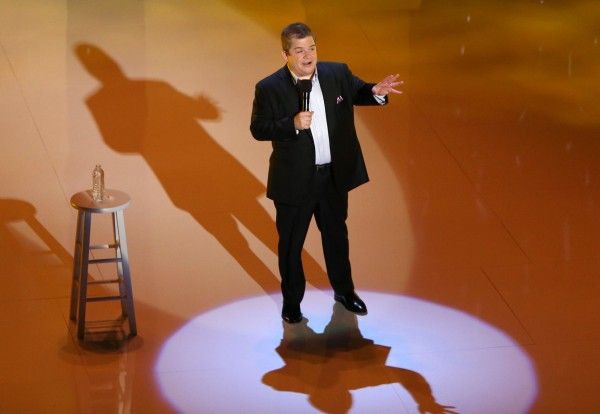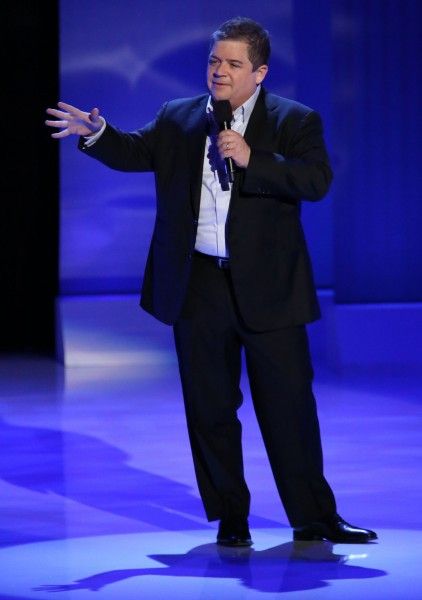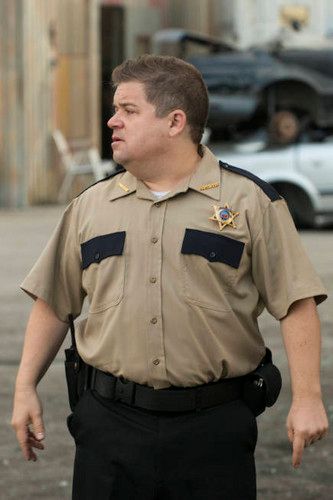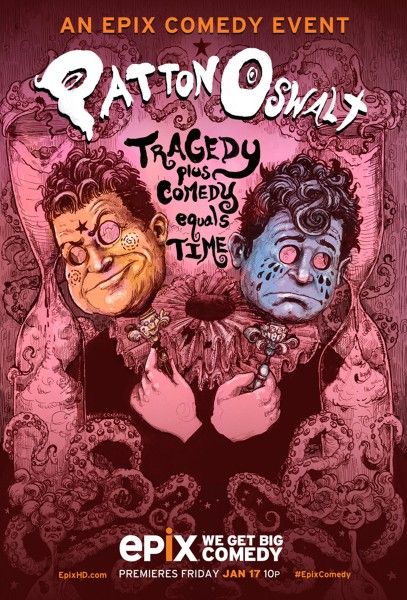The latest stand-up special from comedian Patton Oswalt, Tragedy Plus Comedy Equals Time, directed by Bobcat Goldthwait and premiering on EPIX on January 17th, tackles issues ranging from frozen food to the future of America. Using his trademark blend of acerbic with and unabashed silliness, in front of a packed house at San Diego’s Spreckels Theater, no subject is off limits, including making fun of himself.
During this recent exclusive phone interview with Collider, Patton Oswalt talked about why he wanted to do another stand-up special, what he does to prepare before shooting one of his live performances, how much his material changes and evolves, when he realized he had a knack for comedy, that no topic is off limits to him, and the difference between being funny on stage and being funny in a movie. He also talked about how he’ll be returning to Brooklyn Nine-Nine, the other shows he’d love to do a guest arc on, just how crazy things can get on Twitter, why he thinks comedy films and actors don’t get the recognition they deserve, and how he still hopes to direct someday. Check out what he had to say after the jump.
Collider: Why was now the right time for you to do a comedy special, and is stand-up something that you think you’ll always be compelled to do?
PATTON OSWALT: Yeah, I started off doing stand-up, and that’s what got me into this career. Stand-up is something I just truly love to do, so I’ll always go back to it. I’ll never stop doing it, that’s for sure. The reason to do stand-up was that I had another hour ready.
When you’re going to do a live show, how much time do you spend preparing for it, and do you have people that you test the material out on first?
OSWALT: Yeah, I just do a lot of shows, leading up to the actual taping of the show. That’s just a given. I’ve done that, ever since I started doing stand-up. You just do as many shows as you can to hone what it is you’re working on.
As you perform it, does your show typically change a lot and evolve?
OSWALT: The material changes as you do it, in the months and weeks leading up to the special. Little things get added, and little things get dropped. You have to be ruthless with yourself, in terms of being honest about what is working and what is not. So, I would say there are definitely a lot of changes, as you go along.
Does it affect the performance that you’ll give, knowing that the show is being recorded and even bigger audiences are going to see it later, or are you your harshest critic, regardless of how many people are watching?
OSWALT: It’s always the same for me. Also, I’ve done so many performances leading up to the show that the show, at that point, feels like just another show and I can relax. I go on stage, and that’s my work. You make it this crucial thing and you over-think it, and it’s not as fun as when you just relax and treat the show as a show. You have to have fun with it.
More so than with any other profession, people see a comedian and think, “I’m funny, I can do that,” and they don’t realize just how much of a skill being funny is. Why do you think it’s so hard for people to realize that being funny is an actual skill and not everybody can actually be funny?
OSWALT: Because people like comedy. Something funny has helped a lot of people out. Nobody doesn’t like comedy. So, in liking something so much, and because really good comedy looks so effortless, people just think, “Obviously, I can do that. I get jokes. I laugh at stuff. Thus, I’m funny.” I’ve often written about this. I don’t know why any other profession – athletic, medical, aesthetic, or anything – people look at it as, “Wow, that’s a skill that you learn.” But, people look at comedy and just immediately think they can be great at it. Most people very easily imagine themselves doing comedy.
When did you realize that comedy was something that you had a knack for?
OSWALT: I was always funny, growing up. I never knew if I could do it professionally. Even when I started doing it at open mics and shows, I never really felt comfortable doing it until I had been doing it for four or five years, non-stop, relentlessly. That’s when I felt like, “Okay, maybe I can pull this off.” You can be an amateur and have a passion for something, but it takes a long time to actually become a professional, meaning that you can handle any situation.
Being a comedian, you have to always be aware of what’s going on around you, in the world and in society, so that you can talk about anything in front of an audience, as opposed to the rest of the world that can just live in happy ignorance if they so choose. As you do that, how much does it completely frighten you that you have a young daughter growing up now, in that world? Is it cathartic to share those worries with an audience?
OSWALT: Oh, yeah! I think that’s a lot of the reason that people go to see comedians. We’re all just worried about the same stuff. I see the way the world goes sometimes, and I do worry about my daughter growing up in it. In my real life, even if I wasn’t a comedian, I’d try to find something funny in it. Maybe that’s why people come to the shows.
Is there anything that you won’t talk about in front of an audience, or is there no topic that’s off limits?
OSWALT: There’s no topic that’s off limits to me. There’s only certain approaches that I don’t like. There is not a single topic that I wouldn’t try to make a joke about, if I found something funny about it. If I genuinely found something funny about it, I would never consider any topic off limits. You’re allowed every thought. I’m allowed to at least attempt to make something funny.
What would you say the biggest differences are in being funny on stage in front of an audience versus being funny in a comedy movie? Do you find one to be more of a challenge than the other?
OSWALT: No. They’re both such different disciplines that I never think of one as an impossible thing that I can’t pull off. Both are such their own animal that I just try to approach each one of them totally fresh, and not go, “Well, I do this as a stand-up, so I must do this as an actor.” I think that’s where a lot of comedians get in trouble when they go to acting. They just rely on a very limited skill set, instead of being humble enough to go, “There’s some stuff I need to learn. There’s some stuff I’m not that good at.”
You were terrific on Brooklyn Nine-Nine. How much fun did you have on the show, and is there any chance that Fire Marshall Boone will return, anytime soon?
OSWALT: My character will definitely be back. I definitely had a blast on that show. The only thing I was worried about was that they’re all such great comedic improvisors and actors. They’re all ringers, on that show. When you’re on something that good, you don’t want to be the weak link in something great. So, it’s a double-edged sword, when you get asked to do something like Parks & Rec or Brooklyn Nine-Nine or Justified. I don’t want to be the lame part of this great thing.
It was great to see you play such a different character on Justified.
OSWALT: That show is so great because they take such crazy risks like that, with their characters. Most shows wouldn’t do that, and they do. That just blows me away, to no end.
Is there another show on TV that you’d love to do a guest arc on?
OSWALT: I’d love to be on Veep. I’d love to be on Hello Ladies. Right now, TV is so great. There are just too many amazing shows on. I’d also love to be on Orphan Black.
You’ve very active on Twitter, and very unfiltered. What are some of the craziest experiences you’ve had on Twitter, and have any of those experiences made you think about quitting Twitter?
OSWALT: No because Twitter, to me, is just pure fun. I love when people get wound up, especially by something like Twitter. My whole thing with Salon was so hilarious. I loved that! It just goes to show you that there are humorless people on both sides. It was fascinating to me, at least from a sociological perspective. I don’t want to sound too snotty, but back in the ‘60s, ‘70s and ‘80s, it was the left that was rude and took chances and didn’t mind offending people. That has actually reversed a little bit, and that fascinates me. There was also something really beautiful about the Salon thing because it was a privileged chubby white guy, speaking up for Asians, all of whom got the joke and though tit was hilarious. I just loved that it was so much more offensive that [the guy] was like, “I’m gonna protect these people.” There were all these Asian commenters saying, “Hey, I got the joke. Don’t paint me as this humorless moron, just because you need to fill space. That’s way more offensive, what you’re doing right now.” The white knight phenomenon is hilarious to me. In defending people, they’re ten times more offensive. In speaking up for the offended, they’re being more offensive. I love that! Twitter is pure id. When you have only so many characters, you get a great, raw response. Sometimes it’s a great revealer of how people really are. I love it!
It’s been fun to watch your comments about the Shia LaBeouf situation.
OSWALT: It’s great because you get to see what real sociopathic rationalization looks like. People think they’re explaining themselves, but they don’t realize that what they’re doing is even worse.
Even though actors often talk about how being funny in a movie is much more challenging and terrifying than doing a dramatic role, comedies and performances in comedies are still vastly unrecognized and under-represented when it comes to award season. Why do you think people discount comedies, in those situations, and what do you think it will take for them to get the recognition they deserve?
OSWALT: I don’t know. I love the Academy Awards. I love watching the Oscars. I love all that stuff. But, there is value in making a great movie that is initially ignored. It gives it more weight, down the road. Sometimes missing out on an Oscar gives a movie even more longevity because that becomes part of the story. Can you believe that movie didn’t win an Oscar? Can you believe Bill Murray didn’t get an Oscar for Groundhog Day? Can you believe Hitchcock only got an honorary Oscar? There’s some value in that. So, it doesn’t bother me that much when things don’t get an Oscar. I just wish there was a little more general recognition from people in the industry. Pulling off something like what Bill Murray does with his roles, or even what Eddie Murphy does in The Nutty Professor films where he’s playing five people in heavy make-up, talking to each other from different angles over several weeks is really fucking hard to do, and he pulls it off effortlessly. There needs to be some mention made of that.
You’ve given some really great performances in a variety of different types of films, but are there still any genres or types of characters you’d love to do and haven’t gotten the chance to do yet?
OSWALT: I don’t really think in terms of genres anymore. I just wanna do stuff that’s good. Good can come from anywhere. It can come from a little indie. It can come from a big-budget superhero film. I want to read the script and do something that seems challenging, rather than going, “Okay, I’ve gotta check off this genre.” When you just want to do a genre, no matter what, you end up doing some pretty bad stuff.
Are you still hoping to direct, at some point, or is it too all-consuming, at this point in your life and career?
OSWALT: Right now, my life and career is all-consuming. I will direct someday, I just don’t know how or when. It is a thing that will just happen. Kinda just like my acting career happened. I’ll know when the moment strikes. I know that sounds a little Pollyanna-esque.
In this comedy special, you talk about the door between compromise and success. When do you decide to make those compromises, and when do you feel okay making them?
OSWALT: A lot of times, you don’t decide to make the compromises. They decide on you. You have to make the right decisions, in the moment, and try to keep whatever pieces of your integrity that you can gather around yourself. You don’t know when those moments are gonna come, and that’s the challenge of it.
Tragedy Plus Comedy Equals Time premieres on EPIX on January 17th.




